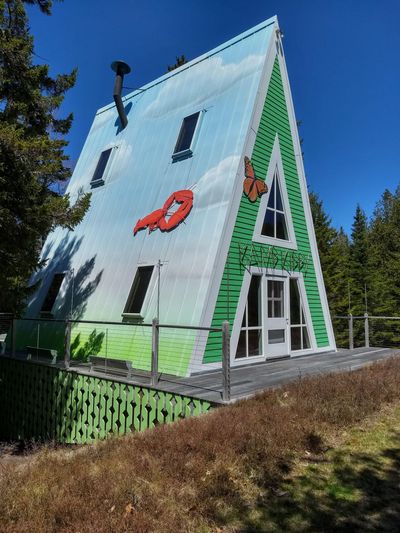Ask the Builder: Don’t build or buy an A-frame house until you’ve tried living in one

Q. I’d like your honest opinion, Tim. A-frame houses have always appealed to me, and I think I want to build one. I’ve done scads of research on these unusual homes, and I’m convinced it’s the right decision. I want you to be the devil’s advocate and try to expose any flaws in my thinking before I make this large financial commitment. Feel free to share any pros as well as cons. – Leslie S., Silver Spring, Maryland
A. It’s fairly easy to let emotion rule the day when it comes to large purchases. It’s usually a great idea to get lots of input from friends as well as professionals. In this case, you should be talking to the top real estate agent in the area where you plan to build this A-frame home. You may discover that an A-frame has a very limited appeal, which would directly affect the home’s resale value.
The first thought that came to my mind when I read the question is, “Have you ever stayed a week in an A-frame home?” A month would be even better, but that could be problematic for a person that doesn’t have lots of vacation time stored up.
The Internet makes it so easy to find any number of A-frame houses you can rent. I’d probably stay in two or three different ones to see how they really work on a day-to-day basis.
I feel a home needs to be functional before you consider its form. That’s a struggle in architecture where form and function tend to tug at one another. As a builder, I can take just about any floor plan and make the outside look contemporary, Victorian, Tuscan villa, etc.
From a construction perspective, A-frame homes are simple triangles. Triangles are perhaps the strongest of all things you can build as long as all the connections between the three sides are engineered. Huge bridges employ triangles. Tension cables or steel beams create triangles in large open steel buildings so they don’t collapse in a windstorm.
If you choose a durable roofing material like steel or virgin polymer roofing shingle, you can end up with minimal exterior maintenance, as two of the four walls are also the roof. That’s a big plus in my book.
Many A-frame homes sport an open floor plan. I’d be very sure this concept works for you. What about visiting guests? Will the A-frame provide enough privacy so the social fabric doesn’t start to fray in a matter of hours or days?
As silly as this sounds, you even have to consider artwork and other wall-hung things you might take for granted. Yes, you can hang pictures and art on slanted walls, but be sure you’re OK with how they might look.
My last piece of advice is to base the final decision on cold hard facts. Don’t hope an A-frame is going to work out. You hope for things you can’t control. You can test-live in an A-frame to see if you really like the day-to-day encounters with the high-angle sloped walls.
Q. Tim, what do you know about washing windows? Do you rely on the blue liquid in the spray bottles and then rub the glass with newspaper? I want really clean glass. Help me, Tim! – Victor B., Corbin, Kentucky
A. I started washing windows as a child. It’s one of the chores my mom made me do. I have vivid memories of her pouring the wretched ammonia into a bucket of water and me having to use rags to apply that smelly solution onto the metal casement windows of my childhood home. To this day I despise the odor of ammonia.
One of my many jobs as a teenager and young adult was working on the steam table of a local chili parlor making thousands of cheese coneys. As you might imagine, it had giant plate-glass windows. The outside surfaces would get covered with the city dirt and grime, and the inside got coated with a fine aerosol of grease from the food preparation process. I marveled at how the windows were cleaned by professionals each week using a magic squeegee instead of the rags I used.
I tried the blue liquid for years and was never satisfied with the results. There always seemed to be streaks. One day I decided to investigate the real secret to clean glass. So I played my syndicated columnist card and spoke with the presidents of two of the largest glass cleaning companies in the USA. I’m talking about companies that clean glass on skyscrapers.
I was shocked to discover how simple it is to get professional results. Both men told me their skilled and talented employees just use water with a little bit of liquid dish soap, or similar cleaning agent. The magic of cleaning glass lies in using this solution to remove all the dirt and grease from the windows. Pros often use lambs-wool applicators to apply the soapy solution. As they wipe the applicator across the glass, it removes all the dirt.
I used to think the rubber squeegee is what did the cleaning. I was wrong. The squeegee is used to just get rid of the excess cleaning solution. The glass is already clean before the pro gets out his squeegee. It’s important to realize you need to use a brass squeegee, not one with a steel frame. Brass will not scratch glass.
If you want to really see how fast and easy it is to clean glass, go online and watch a few videos of professionals cleaning glass. Pay attention to their technique when using the tools. You’ll be amazed that you didn’t try this method years ago!
Subscribe to Tim’s free newsletter and listen to his new podcasts. Go to: www.AsktheBuilder.com.